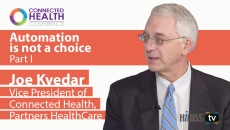Analytics
The Physician Misery Index has increased from 3.78 to 3.94 since 2015 despite increasing awareness of the prevalence of burnout.
The purpose of benchmarking in healthcare is to improve efficiency, quality of care, patient safety and patient satisfaction; AI can help.
Xuanwu Hospital, Capital University of Medical Sciences, CIO Zhigang Liang outlines what hospitals need to understand before embarking on a journey toward Stage 7 on the HIMSS Analytics Electronic Medical Record Adoption Model (EMRAM).
With 11 hospitals validated at Stage 7 on the HIMSS Analytics EMRAM, China has been making great strides toward digitizing healthcare. Yu Quan, CIO at China Medical University's Shengjing Hospital, which achieved Stage 7, talks about the next steps.
AI is on the verge of being de-risked, so the market is poised to flourish as caregivers look to ramp up their patient care efforts.
Jefferson Health’s Robert Neff said that after breaking through that barrier hiring executives should focus on training and building a team with appropriate experience.
As the population ages and there are fewer young people to help with care, the need for effective automation and artificial intelligence in healthcare is more crucial than ever, says Joe Kvedar, vice president of Connected Health, Partners HealthCare.
Blockchain technology is becoming more widespread, and early adopters will be in the best position to take advantage of its potential.
Vice President of Sales Support at NantHealth Wesley Madden offers advice for CIOs and CTOs looking to standardize all of their data sets and explains why artificial intelligence is the ultimate tool for clinicians.
SPONSORED
Ali Slimani, Cerner's general manager of strategic partnerships for Middle East sales, says Cerner is aligned with IHI's "Quadruple Aim," which includes improving patient and clinician experience, creating better healthcare outcomes well as lowering overall cost of care.





